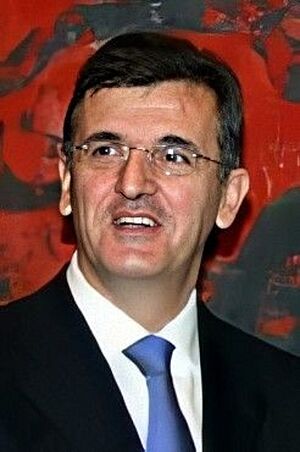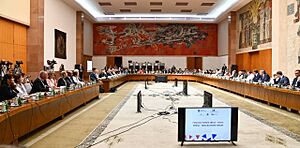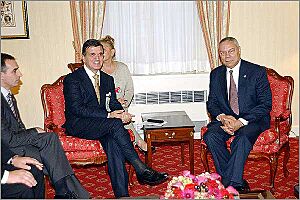Svetozar Marović facts for kids
Quick facts for kids
Svetozar Marović
|
|
|---|---|
|
Светозар Маровић
|
|

Marović in 2004
|
|
| President of Serbia and Montenegro | |
| In office 7 March 2003 – 3 June 2006 |
|
| Preceded by | Vojislav Koštunica (as President of the Federal Republic of Yugoslavia) |
| Succeeded by | Position abolished; Boris Tadić (as President of Serbia) Filip Vujanović (as President of Montenegro) |
| Deputy Prime Minister of Montenegro | |
| In office 11 June 2009 – 29 December 2010 |
|
| Prime Minister | Milo Đukanović |
| Succeeded by | Duško Marković |
| Chairman of the Council of Ministers | |
| In office 7 March 2003 – 3 June 2006 |
|
| Preceded by | Dragiša Pešić |
| Succeeded by | Position abolished |
| President of the Parliament of Montenegro | |
| In office 12 December 1994 – 7 June 2001 |
|
| Prime Minister | Milo Đukanović Filip Vujanović |
| Preceded by | Risto Vukčević |
| Succeeded by | Vesna Perović |
| Personal details | |
| Born | 31 March 1955 Kotor, PR Montenegro, FPR Yugoslavia |
| Political party | DPS (1991–2016) SKCG (until 1991) |
| Spouses | Đorđina "Đina" Marović (née Prelević) |
| Children | 2 (including Miloš Marović) |
| Residences | Belgrade, Serbia |
| Alma mater | Veljko Vlahović University |
| Profession | Lawyer, politician |
Svetozar Marović (Montenegrin Cyrillic: Светозар Маровић; born 31 March 1955) is a Montenegrin lawyer and politician. He was the last leader of the state union of Serbia and Montenegro. He served as both the head of state and head of government from 2003 until Montenegro became independent in 2006.
In December 2015, he was arrested in Montenegro. He later moved to Serbia before he was found guilty in 2017. Montenegro has asked Serbia many times to send him back. In April 2022, the US Treasury added Marović to a list of people facing sanctions related to the Balkans.
Contents
Early Life and Education
Svetozar Marović was born on March 31, 1955, in Kotor. His parents were Jovo and Ivana Marović. He grew up and went to school in Kotor. He then studied law at Veljko Vlahović University in Titograd (which is now Podgorica).
Start of His Political Journey
Marović began his career working for the local government in Budva. He became a leader in youth organizations in Budva and then across Montenegro. He was known for speaking out and publishing a brochure called "Stop Electoral Fraud" in 1984.
After this, he returned to Budva. He helped manage public money and later became the head of the local government. He played a big part in rebuilding Budva after a major earthquake in 1979. He also started the "Theatre City Budva" project in 1987.
Changes in Government
In January 1989, Marović, along with Momir Bulatović and Milo Đukanović, took over leadership in Montenegro. This event was supported by Slobodan Milošević, a leader from Serbia. It was known as the "anti-bureaucratic revolution."
After the first multi-party election in 1990, Marović became a member of Montenegro's parliament. He served as the speaker of the parliament for three terms. A few months after the election, the Communist League of Montenegro changed its name to the Democratic Party of Socialists (DPS).
Leading Serbia and Montenegro (2003–2006)

From March 7, 2003, Marović served as the President of the state union of Serbia-Montenegro. This was a complex role because his own party, the DPS, supported Montenegro becoming an independent country.
Public Apologies
Marović made important public apologies during his time as president.
- On September 10, 2003, he apologized to Croatia for any harm caused by people from Montenegro and Serbia. The Croatian president, Stjepan Mesić, also offered an apology in return. This was a big change from Marović's earlier views. In the early 1990s, he had described an attack on Dubrovnik as a "war for peace."
- On November 13, 2003, he visited Sarajevo and apologized to the people of Bosnia-Herzegovina. He apologized for any suffering caused by people from Serbia-Montenegro. However, the leaders in Bosnia did not offer an apology back.
Military Equipment Issue
In September 2005, a problem with military equipment contracts came to light. A Serbian minister showed a contract signed by Marović. This contract was for supplying equipment to the Army of Serbia-Montenegro. It included a very large number of helmets and body armor suits, much more than the army needed.
The contract was worth a lot of money, about €296 million. While the Minister of Defense was mainly blamed, Marović was criticized for signing the contract. The contract was eventually canceled. Marović stated he was responsible for everything as president. He said he was an "honest man."
Montenegro's Independence Vote
Marović's political party, the DPS, strongly supported Montenegro becoming fully independent. Marović himself campaigned for a "yes" vote in the 2006 referendum. This meant he was leading a state union while also supporting its breakup. After the referendum passed, Marović resigned from his position as president on June 1, 2006.
After the Presidency
In 2007, Svetozar Marović was re-elected as the vice-president of the Democratic Party of Socialists of Montenegro. He supported the Serbian Orthodox Church during disagreements with another church group. In October 2007, he helped negotiate the new Montenegrin Constitution. This agreement stated that the official language would be Montenegrin, using both Latin and Cyrillic alphabets. Other languages like Serbian, Bosnian, Albanian, and Croatian were also recognized.
Later Events and Current Situation
In 2016, Svetozar Marović was arrested in connection with a corruption case in his hometown of Budva. Prosecutors said he was the "head of Budva criminal group," which he later admitted in court. He then went to Serbia, saying he needed medical treatment in Belgrade. He still lives there. Montenegro has repeatedly asked Serbia to extradite him.
In August 2020, Marović spoke to the media for the first time since leaving Montenegro. He accused the leaders of his former party of corruption and unfair practices. He also claimed that President Đukanović had unfairly targeted him and his family. Marović supported opposition parties in the 2020 parliamentary election, which led to a change in government.
Positions Held
| Political offices | ||
|---|---|---|
| Preceded by Vojislav Koštunica as President of the Federal Republic of Yugoslavia |
President of Serbia and Montenegro 2003–2006 |
Position abolished Serbia and Montenegro dissolved into Serbia (president Boris Tadić) and Montenegro (president Filip Vujanović)
|
| Preceded by Dragiša Pešić as Prime Minister of the Federal Republic of Yugoslavia |
Prime Minister of Serbia and Montenegro 2003–2006 |
Position abolished Serbia and Montenegro dissolved into Serbia (prime minister Vojislav Koštunica) and Montenegro (prime minister Milo Đukanović)
|
Images for kids
See also
 In Spanish: Svetozar Marović para niños
In Spanish: Svetozar Marović para niños
 | Shirley Ann Jackson |
 | Garett Morgan |
 | J. Ernest Wilkins Jr. |
 | Elijah McCoy |




